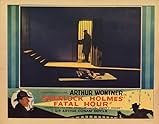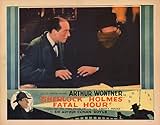A card cheat is threatened with exposure into joining a criminal enterprise that Holmes believes is controlled by Professor Moriarty.A card cheat is threatened with exposure into joining a criminal enterprise that Holmes believes is controlled by Professor Moriarty.A card cheat is threatened with exposure into joining a criminal enterprise that Holmes believes is controlled by Professor Moriarty.
Ian Fleming
- Doctor Watson
- (as Jan Fleming)
Norman McKinnel
- Colonel Henslowe
- (as Norman McKinnell)
Sydney King
- Tony Rutherford
- (as Sidney King)
Philip Hewland
- Inspector Lestrade
- (as Phillip Hewland)
Featured reviews
SHERLOCK HOLMES' FATAL HOUR (1931) shows its age as a creaky early talkie, and the mystery isn't particularly thrilling. But Arthur Wontner is fantastic in the role of Sherlock Holmes and it's a real treat to see him play the sleuth here (for the first of several times).
Holmes is up against his arch-rival, the elusive Prof. Moriarty, the brain behind a vast criminal organization. It's true that there's very little action in this film, but listening to Wontner (as Holmes) explain his deductions and seeing him face off against his nemesis is fun stuff. The subplot about the card cheat gets tedious and it's a little annoying how Watson and Lestrade can never keep up with even the simplest jumps in Holmes's logic ("No one could've shot into this window from street level. And why are you blabbering about trees?"), but it's an enjoyable flick for fans of Arthur Conan Doyle's detective.
Holmes is up against his arch-rival, the elusive Prof. Moriarty, the brain behind a vast criminal organization. It's true that there's very little action in this film, but listening to Wontner (as Holmes) explain his deductions and seeing him face off against his nemesis is fun stuff. The subplot about the card cheat gets tedious and it's a little annoying how Watson and Lestrade can never keep up with even the simplest jumps in Holmes's logic ("No one could've shot into this window from street level. And why are you blabbering about trees?"), but it's an enjoyable flick for fans of Arthur Conan Doyle's detective.
This archaic attempt to bring Sherlock Holmes to the cinema screen is painfully slow-moving and will be hard-going for all but the most dedicated early-talkie buffs, but Arthur Wontner and Ian Fleming (no relation) are agreeable as Holmes and Watson, respectively. The best scene of the film involves a talking painting! ** out of 4.
This is probably the picture with the first portrayal of the famous sleuth that would have absolutely satisfied his 'creator', Arthur Conan Doyle. Arthur Wontner (who would play Holmes in four more movies) is exactly the eccentric, clever, cool and slightly sarcastic type that Doyle's 'Holmes' was in the novels - maybe even more exactly than Basil Rathbone, who would later become the most famous and 'characteristical' Holmes, playing the role no less than 15 times, because Wontner lacks Rathbone's haughtiness, which of course makes him more sympathetic to the audience... And the way he speaks in riddles, until the others actually think he's got some mental problem - although he's just giving them (and us) clues to the solution of the mystery - is also 'typically' Holmes; just like his favorite expression: "Elementary, my dear Watson, elementary!"
The VERY clever and twisted story is also treated in a masterful way and makes this movie, complete with the great acting of ALL involved and the moments of suspense and drama, but also of pure British humor, a REAL enjoyment for any fan of the crime genre or of classic movies in general; it's true that it doesn't have to show the scary special effects that the films with Rathbone had 10 years later - but it's a REAL treat for even the most demanding film fan to watch Holmes, obsessed with the idea that his arch-enemy, the criminal mastermind Moriarty, is behind all this, untangle the seemingly incoherent stories of card sharks and diplomats, real and forged money, boot makers and park trees; and maybe even be able to follow the master sleuth's thoughts and deductions!
One of the VERY best adaptations ever of a Sherlock Holmes adventure, this movie can easily compete with most of the - today much more famous - films starring Rathbone.
The VERY clever and twisted story is also treated in a masterful way and makes this movie, complete with the great acting of ALL involved and the moments of suspense and drama, but also of pure British humor, a REAL enjoyment for any fan of the crime genre or of classic movies in general; it's true that it doesn't have to show the scary special effects that the films with Rathbone had 10 years later - but it's a REAL treat for even the most demanding film fan to watch Holmes, obsessed with the idea that his arch-enemy, the criminal mastermind Moriarty, is behind all this, untangle the seemingly incoherent stories of card sharks and diplomats, real and forged money, boot makers and park trees; and maybe even be able to follow the master sleuth's thoughts and deductions!
One of the VERY best adaptations ever of a Sherlock Holmes adventure, this movie can easily compete with most of the - today much more famous - films starring Rathbone.
It's nice that this film exists, but as it stands it's a major disappointment. Director Leslie Hiscott and cinematographers Sydney Blythe and William Luff get some nice proto-noir compositions into the first and last reels, but in between it's a very claustrophobic movie that seems to take place entirely indoors, either in the home of Ronald Adair or in Sherlock Holmes' and Dr. Watson's digs at 221B Baker Street. We know the film is set in 1930 instead of the 1890's because Holmes deduces that Watson is having trouble with his car, but we never see any cars — or much action of any kind. It's just eight reels of dull, ill-paced talk (where was Alfred Hitchcock when they needed him? Actually working at a bigger, more prestigious British studio than Twickenham!), sloppily recorded by Baynham Honri, who for some reason gets an on-screen credit in type as big as the director's. And though I usually respect the critical judgments of the late William K. Everson — who said Arthur Wontner was one of the two best actors ever to play Holmes — he's never convinced me in the role. He's perfectly adequate in the scenes showing Holmes as a cerebral "armchair detective" but utterly wrong for the neurotic man of action Sir Arthur Conan Doyle also intended Holmes to be. But then to me (to paraphrase the opening of the Conan Doyle Holmes story "A Scandal in Bohemia") Basil Rathbone (who looked uncannily like the Sidney Paget illustrations for the original Holmes stories and did both the cerebral and the active sides of the character consummately well) will always be THE Sherlock Holmes.
Creaky and confined early talkie from the UK that is the first of five in this Sherlock Holmes series.
A few of the impressionistic scenes are impressive and lend what little atmosphere is available in the technological and limited restraints of the period. There are some interesting and odd little flourishes and we have some pre-code dialog like "oh my God" and "go to Hell" that would become no-no's in the years ahead.
While the dated delivery is the damper in this otherwise OK presentation and it looks theatrical, but is somewhat enhanced by the creepy characters and some dark and mysterious images. Holmes, Watson, Moriarty, La Strade, and Mrs. Hudson are all respectful renditions. The "game" afoot is complex and Sherlock's deductions are sound.
This long lost film is a welcome find for aficionados and an example of sound movies finding their way, and an artifact worth a view for its time and place. The biggest fault is not its confinement but its soggy and slow delivery of almost all of the dialog where it feels like they were not sure that the on set concealed microphone would catch every word.
A few of the impressionistic scenes are impressive and lend what little atmosphere is available in the technological and limited restraints of the period. There are some interesting and odd little flourishes and we have some pre-code dialog like "oh my God" and "go to Hell" that would become no-no's in the years ahead.
While the dated delivery is the damper in this otherwise OK presentation and it looks theatrical, but is somewhat enhanced by the creepy characters and some dark and mysterious images. Holmes, Watson, Moriarty, La Strade, and Mrs. Hudson are all respectful renditions. The "game" afoot is complex and Sherlock's deductions are sound.
This long lost film is a welcome find for aficionados and an example of sound movies finding their way, and an artifact worth a view for its time and place. The biggest fault is not its confinement but its soggy and slow delivery of almost all of the dialog where it feels like they were not sure that the on set concealed microphone would catch every word.
Did you know
- TriviaThis was thought to be a lost film until a print was discovered in the US.
- Quotes
Inspector Lestrade: You know, Watson, although I've known Holmes for some years, I sometimes wonder if he's all there.
- ConnectionsEdited into Who Dunit Theater: Sherlock Holmes "The Sleeping Cardinal" (2016)
Details
- Release date
- Country of origin
- Language
- Also known as
- Sherlock Holmes' Fatal Hour
- Filming locations
- Production company
- See more company credits at IMDbPro
- Runtime
- 1h 24m(84 min)
- Color
Contribute to this page
Suggest an edit or add missing content























